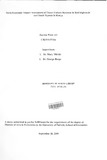| dc.description.abstract | Biotechnology can make very important contribution to the socio economic welfare of citizens in developing countries (Qaim, 1999). This study was therefore set up to assess the social and economic impacts brought about by the dissemination of the Tissue Culture banana technology to resource poor fanners in Kisii highlands and South Nyanza in Kenya. The survey purposively selected seven districts where 100 households were interviewed using a structured questionnaire.
Data was analyzed using economic surplus model. The study established that Tissue culture banana technology had a positive social and economic impact in Kisii highlands and South Nyanza. The technology led to an increase by 86 percent in quantity of bananas demanded for the market as compared to the conventional bananas. Increasingly, the bananas were being taken to the market due to high yields using human transport. The yields rose by 79 percent due to clean planting materials.
The cost of plantlets made the largest cost item in the 'I'C banana enterprise establishment. The survey established a high elastic price elasticity of supply and demand at 1.67 and 1.77 respectively. This indicated the sensitivity of the banana fruit to price changes. The enterprise was a worthwhile investment indicating a rise in income from banana earnings by 84 percent with an internal rate of return of 34 percent on capital invested.
The technology improved the livelihoods of households in the areas it was adopted as funds were available to take care of family's financial needs. The positive total technology surplus indicates improvement in the welfare of those who adopted the technology. The technology improved the social welfare through enhanced food security, diet diversification and an increase in income. Group members were also empowered to take leadership positions in the society. Diseases, lack of micro-credit, poor group - dynamics, lack of information, lack of enough land, poor transport network, subsistence farming and limited distribution of plantlets system were identified as constraints to the success of the technology diffusion. | en_US |

